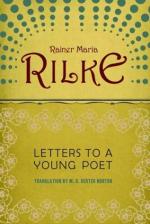
|
| Name: _________________________ | Period: ___________________ |
This test consists of 15 multiple choice questions and 5 short answer questions.
Multiple Choice Questions
1. What does Rilke believe is wrong with sex?
(a) It is not wholly human and is based on temporary emotions.
(b) It subordinates women.
(c) It distracts the artist from his work.
(d) It goes against Christianity.
2. What novel does Rilke discuss in letter three?
(a) Pifer.
(b) Jude the Obscure.
(c) Niels Lyhne.
(d) Across the World.
3. What does Rilke advise the poet to do in regard to his efforts to get published?
(a) Send his poems to Rilke's publisher.
(b) Send his poems to the United States.
(c) Discontinue his efforts to receive feedback from publishers and other external parties.
(d) Send his poems to as many magazines as possible.
4. In the fourth letter, what does Rilke instruct the young poet to do regarding the poet's unanswered questions?
(a) Love the questions.
(b) Seek answers from poetry.
(c) Seek answers in solitude.
(d) Seek answers from artists.
5. Rilke says that there is only one thing that "can grasp and hold and be just toward" art. What is that thing?
(a) Love.
(b) Open-mindedness.
(c) Creativity.
(d) Hope.
6. What has brought Rilke to the place from where he writes the second letter?
(a) Rilke has moved there because the community is very supportive of his writing.
(b) Rilke has moved there to work on his writing.
(c) Rilke has moved there to get well.
(d) Rilke has moved there to be close to his family.
7. What does Rilke send to the young poet in reply to the poet's first letter?
(a) A letter and the poet's poems.
(b) A list of potential publishers.
(c) A volume of Rilke's poetry.
(d) Money.
8. From where does Rilke write the fourth letter?
(a) Worpswede, near Bremen, Germany.
(b) Berlin, Germany.
(c) Viareggio, near Pisa, Italy.
(d) Paris, France.
9. What city has Rilke departed from to come to the place where he composes the fourth letter?
(a) Worpswede, near Bremen, Germany.
(b) Viareggio, near Pisa, Italy.
(c) Paris, France.
(d) Berlin, Germany.
10. From whom does Rilke advise the young poet to avoid seeking advice?
(a) Military officers.
(b) Artists.
(c) Parents.
(d) Poets.
11. What does Rilke enclose with his third letter to the young poet?
(a) A note to Professor Horacek.
(b) Names of publishers to whom the young poet can send his work.
(c) A list of his most recent books.
(d) Copies of some of his poems.
12. What does Rilke tell the young poet about irony?
(a) Irony should be sparingly used.
(b) Irony should be liberally used.
(c) Irony should only be used for humor.
(d) Irony should never be used.
13. To what does Rilke compare artistic experience?
(a) Transcendence.
(b) Epiphany.
(c) Religion.
(d) Sex.
14. How does Rilke say one can know if a poem is good?
(a) If it helps readers understand life.
(b) If it reflects human nature.
(c) If it is inspired by necessity.
(d) If it moves its readers.
15. In what season does Rilke write the second letter?
(a) Winter.
(b) Spring.
(c) Summer.
(d) Fall.
Short Answer Questions
1. How does Professor Horacek know Rilke?
2. What writer and personal acquaintance does Rilke discuss in letter three?
3. Why does it take Rilke so long to respond to the young poet's second letter?
4. What does Rilke advise the young poet to buy in letter three?
5. Rilke writes that "most events are inexpressible," and says that one category of things is more inexpressible than all the rest. What is this category?
|
This section contains 605 words (approx. 3 pages at 300 words per page) |

|




